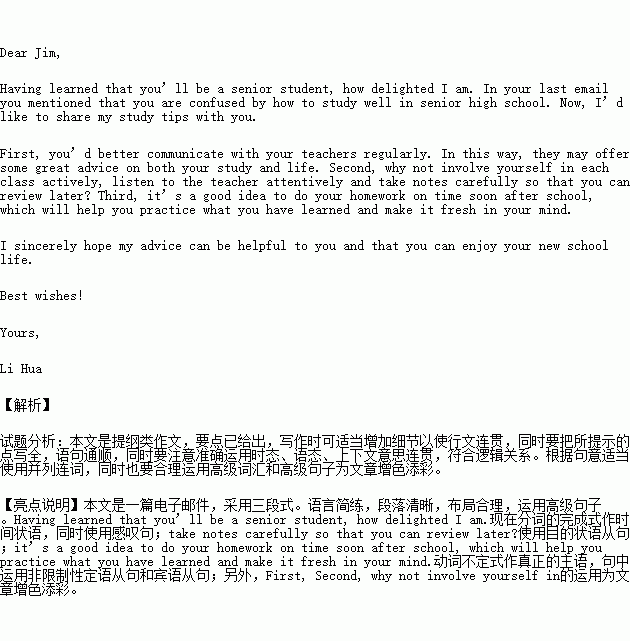题目内容
假定你是高中学生李华,你的美国朋友Jim即将升入中国的一所高中学习,想让你给他一些学习建议。请你给他写一封电子邮件,内容包括:
1. 与老师交流,征求老师意见;
2. 上课积极参与讨论,专心听讲,做好笔记;
3. 课后积极完成作业,巩固知识。
注意:1.词数100左右; 2.可以适当增加细节,以使行文连贯。
Dear Jim,
_______________________________________________________________________________
_______________________________________________________________________________
_______________________________________________________________________________
_______________________________________________________________________________
_______________________________________________________________________________
_______________________________________________________________________________
_______________________________________________________________________________
_______________________________________________________________________________
_______________________________________________________________________________
_______________________________________________________________________________
Yours,
Li Hua
假定你叫王敏,是一名高三年级的学生,在学习英语的过程中你遇到一些问题,想得到老师的帮助。现在请给你的英语老师Miss Li写一封求助信,内容如下:
学习英语时你遇到的问题 | 生词多,记忆有难度;语法难,理解有障碍,写作提高有困难;…… |
请求老师提供帮助 | 讲解记单词的方法;授课时慢一些;传授学习语法及提高写作的方法;…… |
注意:1.内容包括所有要点,可以适当发挥,不要简单翻译;
2.词数100左右。开头和结尾已经写好,不计入总词数。
Dear Miss Li,
I'm one of your students in Class Six,Senior Three. Nowadays _______________________________________________________________________________
_______________________________________________________________________________
_______________________________________________________________________________
_______________________________________________________________________________
_______________________________________________________________________________
_______________________________________________________________________________
_______________________________________________________________________________
_______________________________________________________________________________
_______________________________________________________________________________
_______________________________________________________________________________
Thank you.
Yours sincerely,
Wang Min

